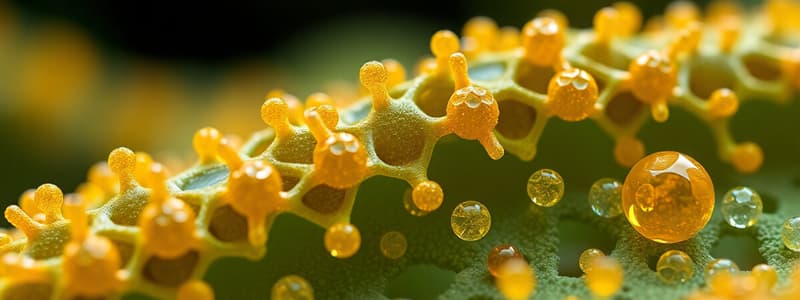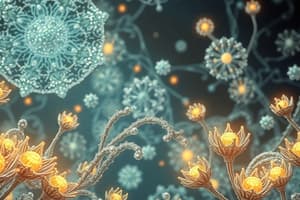Podcast
Questions and Answers
What was the main inspiration for nanobiotechnology mentioned in the dialogue?
What was the main inspiration for nanobiotechnology mentioned in the dialogue?
- The development of quantum mechanics
- Feynman's speech about writing on a pinhead (correct)
- The features of biological cells
- The concept of small particles behaving differently
Which principle is emphasized regarding the behavior of atoms on a small scale?
Which principle is emphasized regarding the behavior of atoms on a small scale?
- They behave similarly to larger objects
- They follow the laws of classical mechanics
- They satisfy the laws of quantum mechanics (correct)
- They exhibit unpredictable behavior
What challenge does Feynman suggest must be overcome to achieve significant advancements in nanotechnology?
What challenge does Feynman suggest must be overcome to achieve significant advancements in nanotechnology?
- The need for larger writing tools
- The difficulty of achieving minute precision
- The reduction of sizes by 25,000 times (correct)
- The understanding of biological processes
What unique properties do small biological cells possess, according to the content?
What unique properties do small biological cells possess, according to the content?
Which of the following best describes the potential implications of nanobiotechnology?
Which of the following best describes the potential implications of nanobiotechnology?
What is the typical size range of objects classified as nanomaterials?
What is the typical size range of objects classified as nanomaterials?
Which of the following best describes the quantum size effect?
Which of the following best describes the quantum size effect?
What is one feature that distinguishes a nano factory, like a cell, from traditional factories?
What is one feature that distinguishes a nano factory, like a cell, from traditional factories?
What property of nanomaterials can result in super hydrophobicity?
What property of nanomaterials can result in super hydrophobicity?
Which of the following applications is NOT typically associated with nanotechnology?
Which of the following applications is NOT typically associated with nanotechnology?
Why are enzymes described as having 'high specificity' in the context of nanomachines?
Why are enzymes described as having 'high specificity' in the context of nanomachines?
What effect does nanotechnology have on the mechanical properties of materials?
What effect does nanotechnology have on the mechanical properties of materials?
What role do bio-chaperones play in the assembly of bio-nanomachines?
What role do bio-chaperones play in the assembly of bio-nanomachines?
What sectors are influenced by nanobiotechnology?
What sectors are influenced by nanobiotechnology?
Which of the following is a potential benefit of nanobiotechnology?
Which of the following is a potential benefit of nanobiotechnology?
What ethical consideration is highlighted in relation to nanobiotechnology?
What ethical consideration is highlighted in relation to nanobiotechnology?
Why have developed economies incorporated nanobiotechnology into their research plans?
Why have developed economies incorporated nanobiotechnology into their research plans?
Which aspect of nanobiotechnology can aid in economic growth?
Which aspect of nanobiotechnology can aid in economic growth?
What is a potential drawback of emerging frontier technologies like nanobiotechnology?
What is a potential drawback of emerging frontier technologies like nanobiotechnology?
In which areas has nanobiotechnology advanced technologies?
In which areas has nanobiotechnology advanced technologies?
What interdisciplinary fields interact with nanobiotechnology?
What interdisciplinary fields interact with nanobiotechnology?
What is the turnover number of biological nanomachines such as enzymes?
What is the turnover number of biological nanomachines such as enzymes?
What does the high fidelity of DNA replication help ensure?
What does the high fidelity of DNA replication help ensure?
What is the probability of a newly synthesized DNA containing a wrong base?
What is the probability of a newly synthesized DNA containing a wrong base?
What is the universal 'energy currency' for all life systems?
What is the universal 'energy currency' for all life systems?
What aspect of a cell does self-regulation control?
What aspect of a cell does self-regulation control?
What is the primary application of biochips?
What is the primary application of biochips?
Which technology allows for direct, real-time analysis of long DNA or RNA fragments?
Which technology allows for direct, real-time analysis of long DNA or RNA fragments?
What is a key characteristic of nanodrugs?
What is a key characteristic of nanodrugs?
What does the term 'nanobiotechnology' refer to?
What does the term 'nanobiotechnology' refer to?
What is the significance of the high sensitivity of biosensors?
What is the significance of the high sensitivity of biosensors?
How much data can be stored in 1 cubic mm of DNA?
How much data can be stored in 1 cubic mm of DNA?
What is a common use for organ-on-chip technology?
What is a common use for organ-on-chip technology?
What is the energy density characteristic of nano biofuels?
What is the energy density characteristic of nano biofuels?
What type of effects are studied under nano bioeffects?
What type of effects are studied under nano bioeffects?
Study Notes
Nanobiotechnology: Early Inspiration
- Richard Feynman, Nobel Laureate and considered the "Father of Nanotechnology", stated in 1959 that there is "plenty of room at the bottom".
- Feynman questioned whether the entire 24 volumes of the Encyclopedia Britannica could be written on the head of a pin.
- He highlighted the possibility of manipulating matter at the atomic level, opening doors for new discoveries and applications.
- He acknowledged the capabilities of biological cells as "exceedingly small".
Nanoworld: Scale
- The nanoworld encompasses the range between 1-100 nanometers (nm).
- This scale falls between the micro (10^-6 meter) and the macro (>10^9 meter) scales.
- At the nanoscale, objects exhibit unique properties compared to their larger counterparts.
Nanotechnology: Properties and Applications
- Surface effects: Nanomaterials have a high surface area to volume ratio, leading to increased chemical reactivity and enhanced catalytic properties.
- Small size effect: Nanomaterials exhibit unique optical, electrical, magnetic, and mechanical properties due to their size.
- Quantum Size Effect and Tunnel Effect: At the nanoscale, quantum effects become significant, leading to changes in material properties.
Nanomaterials: Marvelous Properties
- Active chemical reactions: Nanomaterials possess high surface areas, leading to increased reaction rates.
- Antimicrobial effect: Nanomaterials can exhibit antimicrobial properties, making them useful for medical applications.
- Superhydrophilic and superhydrophobic: Nanomaterials can exhibit extreme wettability, either repelling or attracting water.
- Extinction effect: Some nanomaterials can absorb a wide range of light wavelengths, making them useful for optical applications.
- Rigidity and ductility of ceramics: Nanomaterials can enhance the mechanical properties of ceramics.
- Higher strength and lighter weight: Nanomaterials can be used to create lighter and stronger materials for various applications.
- Increased control of light spectrum: Nanomaterials can influence how light interacts with them, finding applications in photonics and optical devices.
- Greater chemical reactivity: Nanomaterials have high surface area to volume ratios, leading to increased reactivity.
- Changed conductivity: The electrical conductivity of materials can be altered at the nanoscale.
Applications of Nanomaterials
- Nano catalysts: Nanomaterials with enhanced surface areas act as efficient catalysts.
- Nano devices: Creation of miniaturized devices and sensors with enhanced functionalities.
- Nanoelectronics: Advancements in electronic components and circuits with improved performance.
- Nanomachines: Development of microscopic machines capable of performing specific tasks.
- Nanomedicine: Tailored applications of nanomaterials for diagnosis, treatment, and drug delivery.
- Nanobiotechnology: Integration of nanotechnology with biological systems for various applications.
Cells: Natural Nano Factories
- A cell is a complex system teeming with biological nanomachines.
- Cells are capable of self-assembly, driven by chemical forces and assisted by chaperones.
- Biological nanomachines, like enzymes and antibodies, exhibit high specificity for their target molecules.
- Enzyme nanomachines demonstrate high efficiency with turnover numbers on the order of 10^3.
- DNA replication exhibits high fidelity, with sophisticated mechanisms to minimize errors during replication.
- Cells utilize chemical energy from food, stored as ATP, for various cellular processes.
- Cells possess self-regulation mechanisms to control information, material, and energy flow.
Applications of Nanobiotechnology
- Biosensors: Highly sensitive and selective sensors for in vivo detection and field use.
- Nano probes: Cell and body imaging with super sensitivity and high resolution.
- Biological motors: Core components of micro-robots, driving nanomachines with high precision and efficiency.
- Biological machines: High-precision nanomachines with high fidelity and efficiency.
- Biochips: High-throughput screening and detection platforms for various applications.
- Organ-on-chip: Mimicking human organs on a chip to predict drug responses and external stimuli.
- DNA storage: High storage capacity, storing data in DNA molecules.
Nanobiotechnology: Growth and Impact
- The field of nanobiotechnology has witnessed significant growth in research and development.
- This field has a wide range of applications across diverse industries and contributes to human well-being.
Conclusion
- Nanobiotechnology is an interdisciplinary field, drawing from chemistry, physics, materials science, information sciences, and engineering.
- It addresses various scientific problems and creates opportunities for economic growth.
- The development and peaceful use of nanobiotechnology require ethical considerations and international regulations.
- Emerging frontier technologies like nanobiotechnology offer both opportunities and challenges.
Studying That Suits You
Use AI to generate personalized quizzes and flashcards to suit your learning preferences.
Related Documents
Description
This quiz explores the early inspirations behind nanobiotechnology, focusing on Richard Feynman's contributions and the significance of nanoscale materials. It covers the unique properties and applications of nanomaterials, including their surface effects and implications in various fields.




